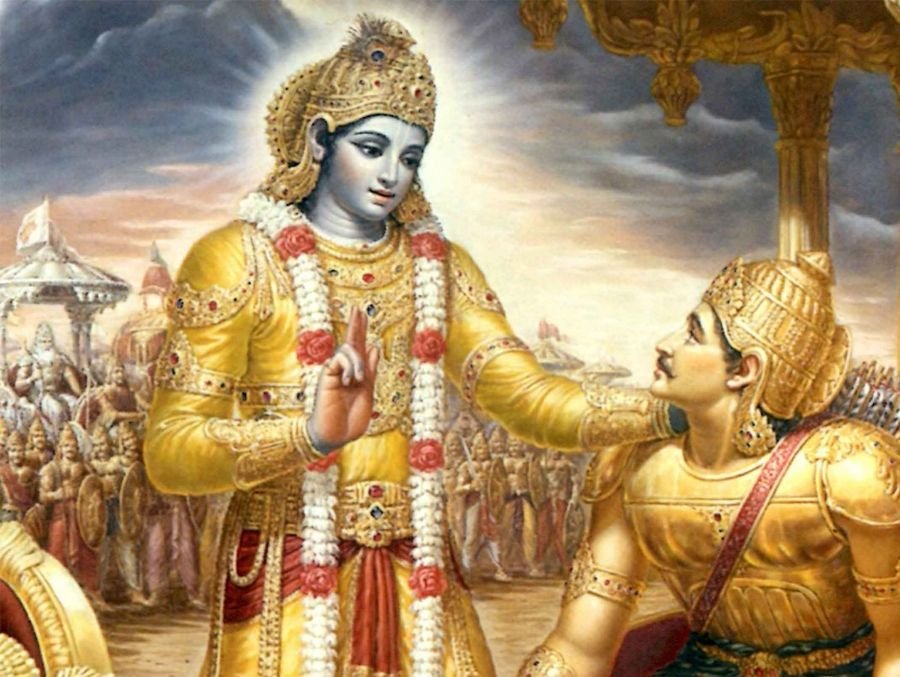(Image Courtesy Mahanidhiswami)
The Supreme Lord Has A Multitude Of Contradicting Attributes
सर्वेन्द्रियगुणाभासं सर्वेन्द्रियविवर्जितम् |
असक्तं सर्वभृच्चैव निर्गुणं गुणभोक्तृ च || 13.15||
sarvendriya-guṇābhāsaṁ sarvendriya-vivarjitam
asaktaṁ sarva-bhṛich chaiva nirguṇaṁ guṇa-bhoktṛi cha|| 13.15||
Shloka Translation
BG – Ch. 13- Ver. 15:
Despite the fact that He perceives all sense-objects, He is empty of them. He is detached from everything, yet He is the source of all life. Despite the fact that He has no qualities, He enjoys the three forms of material nature.
Explanation
After claiming that God’s senses are everywhere, Shree Krishna now claims that He has no senses. We will find this paradoxical if we try to explain it using everyday logic. “How can God have infinite senses while yet being devoid of senses?” we’ll ask. Ordinary logic, on the other hand, does not apply to Him who is beyond the intellect’s reach. At the same time, God has an endless number of conflicting qualities.
He lacks the mundane senses that we have, thus it is acceptable to say that He is devoid of them. “He is devoid material senses,” However, because He has divine senses that are everywhere, it is equally true to state that God’s senses are everywhere.
Furthermore, Shree Krishna claims to be both the creator and the sustainer of creation. God preserves the entire creation in His form as Lord Vishnu. He sits in the hearts of all living beings, records their karmas, and calculates their outcomes. Brahma, who is under Lord Vishnu’s control, manipulates the rules of material science to keep the universe running smoothly.
The celestial gods also arrange for the air, earth, water, rain, and other necessities of life to be provided under Lord Vishnu’s dominion. As a result, God is the Sustainer of everything. He is, nevertheless, complete in Himself and so separate from everyone. He is also nirguṇa , because these guṇas are material, while God is divine.
Verse & what we can learn
The eternal essence cannot be understood by the mind as an object or an idea. In this series of shlokas, Shri Krishna employs the Upanishadic method of expressing the eternal essence through contradictions and contradictions. The first contradiction is that the eternal essence is both inside and outside all inert and living substances. This remark warns us against thinking of the everlasting essence as being restricted by space, as if it exists only in one place and not the other.
The second inconsistency is that the everlasting essence is to be known as the ultimate knowledge, but due to its subtle nature, it is beyond comprehension. Those who have not cleaned their minds are unable to comprehend the eternal nature. It is, however, always accessible to those who have cleaned their minds and pursued a systematic procedure of inquiry under the guidance of scriptures and a teacher.
The third inconsistency. For those who have carefully inquired about the nature of the everlasting essence, it is always available as the self, the “I” within us. It is, nevertheless, a long distance away for people who are uneducated.
To acquire knowledge and to implement that knowledge in life one needs to be mentally and physically active and healthy and for that daily meditation is a great tool.
There are various types of meditation like Buddhist meditation, heartfulness meditation, mindfulness meditation, meditation for stress, and each meditation benefits are countless. There is also numerous meditation techniques for beginners which help in practicing daily meditation so go ahead and start your journey towards a peaceful and balanced life.
In the next shloka, also Shri Krishna continues to tell more about these contradictory qualities.
Let’s learn to live with “The Gita” via Meditation Affinity…
